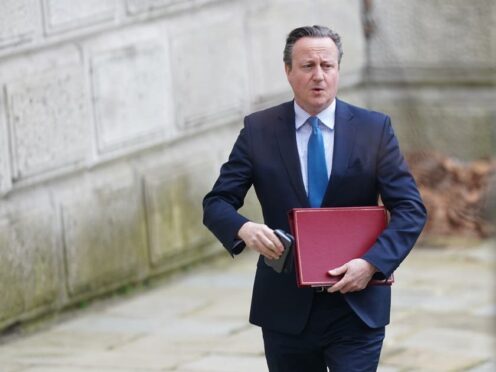Lord David Cameron said there was “incredible unity between allies” when asked about a leaked call between German military officials about Ukraine which included details of UK operations.
The Foreign Secretary’s visit to Berlin on Thursday came just days after Russia intercepted a telephone conversation in which officials were heard suggesting British service personnel were on the ground in Ukraine.
He was asked at a press conference alongside his German counterpart Annalena Baerbock whether he agreed with Berlin’s assessment that trust among allies was unbroken.
Lord Cameron said: “I don’t want to play into the hands of some Russian narrative about divisions between allies. What I see … is incredible unity between allies, incredible unity in Nato.
“Of course, we’re going to have areas where we want to discuss what more we can do, what more we can help. And those are the sorts of discussions that good friends and allies with this unity have in private.”
His visit also came as German Chancellor Olaf Scholz faced continued pressure from Western allies and politicians in Berlin to supply Ukraine with long-range Taurus missiles.
Mr Scholz has been unwilling to send the Taurus cruise missiles to Kyiv on the grounds that German soldiers would have to be sent to Ukraine to help operate them, dragging Germany into war with Russia.
Asked whether the UK is pushing Berlin to send its Taurus missiles, Lord Cameron said “it was a matter for the German government to decide” and that he could “only speak for Britain’s experience of how effective these weapons have been at helping Ukraine to fight off this illegal aggression”.
Peace will be achieved “through strength,” he said.
“You get peace by demonstrating that Putin cannot win, you get peace by helping the Ukrainians deliver what they need on the battlefield.”
He also downplayed concerns about a possible escalation of the conflict.
“At every stage it’s been said ‘if you give anti-tank weapons to the Ukraine, that’s escalation’. No, it wasn’t.
“‘If you give tanks to the Ukrainians, that’s escalation’. No, it wasn’t. ‘If you give long-range artillery or long-range fires to the Ukrainians, it’s escalation’. No, it isn’t.
“I think the reason for that is clear. If what you’re doing is helping a country defend itself from illegal and completely unjustified aggression, then there should be nothing to stop you helping that country to fight back to recover its territory.
“As long as we’re not in a situation where a Nato soldier is killing a Russian soldier, we are not causing escalation. We’re allowing Ukraine to defend itself.”
Downing Street has previously urged Nato countries to supply Ukraine with long-range missiles, following the UK’s decision to send Storm Shadow missiles to the country last year.
In a sign of disagreement within the German government over the Taurus issue, Ms Baerbock said in her remarks that countries needed to do “whatever they can to provide Ukraine with the means it needs to defend itself”, including “more long-range weapons”.
In their talks, Lord Cameron and Ms Baerbock also discussed illegal immigration and the Israel-Hamas conflict in Gaza.
